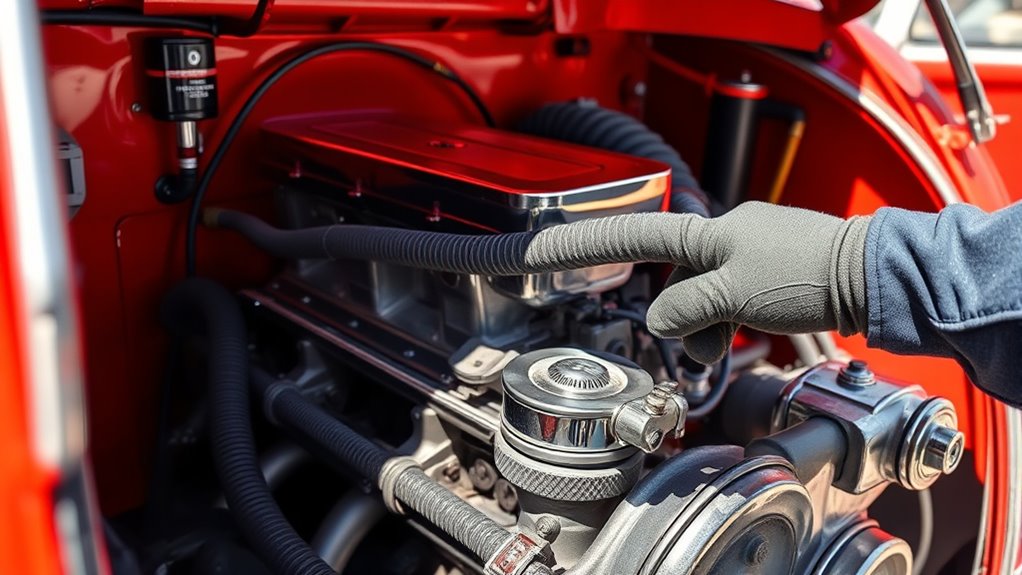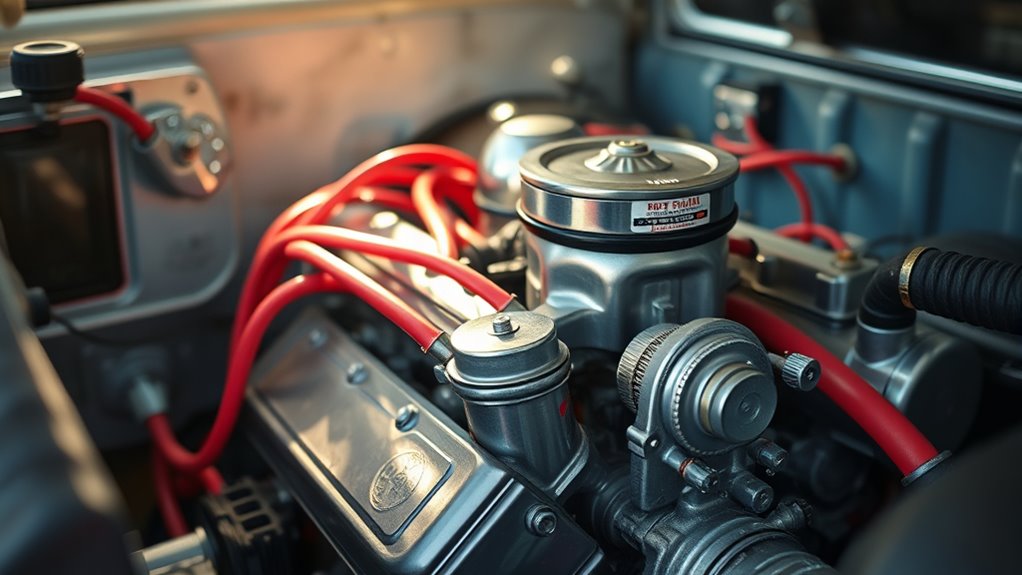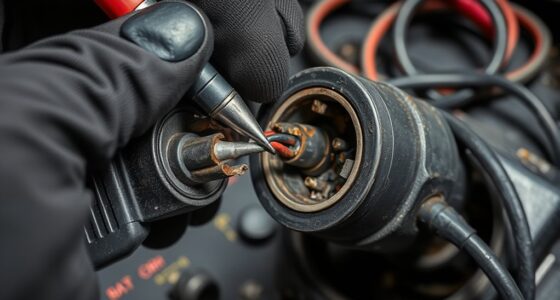To troubleshoot your VW Bus engine, start by checking the fuel level and inspecting for leaks or blockages in fuel lines and filters. Then, examine your spark plugs, wires, and distributor cap for wear or corrosion. If those look good, test the fuel pressure and ignition system components. Combining these steps helps identify common issues like fuel pump failure or ignition faults. Keep exploring to discover more tips that can keep your engine running smoothly.
Key Takeaways
- Check fuel levels and inspect fuel lines and filters for blockages or leaks.
- Examine spark plugs and ignition wires for wear, fouling, or damage.
- Test fuel pressure and listen for fuel pump noises to diagnose delivery issues.
- Inspect distributor cap, rotor, and ignition coils for cracks or corrosion.
- Perform routine maintenance like replacing spark plugs and cleaning fuel filters to prevent common problems.

If your VW Bus engine isn’t running smoothly, troubleshooting can help identify and fix the issue quickly. One common cause of engine problems is a malfunction in the fuel system. When the fuel system isn’t delivering fuel properly, your engine may stall, misfire, or struggle to start. Begin by checking the fuel level—low fuel can cause performance issues, so make sure you have enough in the tank. Next, inspect the fuel lines for leaks, cracks, or blockages. If you notice any debris or buildup, cleaning or replacing the fuel filter might resolve the problem. Also, ensure the fuel pump is functioning correctly; a faulty pump can prevent fuel from reaching the engine, leading to poor performance or failure to start altogether. Listening for strange noises from the fuel pump or testing fuel pressure can help diagnose these issues. Remember, a well-maintained fuel system is crucial for smooth engine operation, so addressing any irregularities promptly keeps your VW Bus running reliably. Regular maintenance of the fuel system can also prevent common engine issues and extend the lifespan of your vehicle.
Beyond the fuel system, ignition issues are another frequent culprit behind engine troubles. If your engine misfires, stalls, or refuses to start, check the ignition system carefully. Start with the spark plugs—they should be clean, properly gapped, and free of carbon buildup. Worn or fouled plugs can cause misfiring and rough running. Inspect the ignition wires for cracks or corrosion; damaged wires can prevent the spark from reaching the plugs efficiently. The distributor cap and rotor should also be examined for cracks or carbon tracking, which can disrupt the ignition timing. If you have an electronic ignition system, make sure the module and ignition coil are functioning correctly. Faulty ignition coils can cause weak or inconsistent sparks, leading to engine hesitation or stalling. Testing the ignition system with a multimeter or swapping parts can help pinpoint the problem.
In many cases, ignition issues and fuel system problems are interconnected, and addressing one can improve the other. Regular maintenance, including replacing spark plugs, filters, and inspecting fuel lines, keeps these systems in top shape. When troubleshooting, always start with simple checks—like fuel levels and spark plug condition—before moving to more complex diagnostics. This approach saves time and money while ensuring your VW Bus’s engine runs smoothly. Whether it’s a clogged fuel filter, worn ignition components, or fuel pump failure, identifying the root cause quickly allows you to fix the problem efficiently. Staying proactive with routine inspections and maintenance is the best way to prevent these issues from escalating and keeping your vintage VW Bus on the road for years to come.
Frequently Asked Questions
How Often Should I Perform Engine Maintenance on My VW Bus?
You should perform engine maintenance on your VW bus regularly to keep it running smoothly. Aim for oil change intervals every 3,000 to 5,000 miles, depending on driving conditions. Additionally, check and replace spark plugs roughly every 30,000 miles to guarantee peak performance. Regular inspections and timely replacements help prevent issues, extend engine life, and keep your VW bus running reliably.
What Are the Signs of a Failing Fuel Pump?
When your fuel pump starts to fail, you’ll notice key fuel pump symptoms. Your engine might sputter, stall, or have trouble starting, especially when hot. You could also experience a decrease in power or inconsistent acceleration. A failing pump may produce whining noises from the tank. If you notice these signs, it’s essential to get it checked promptly, since ignoring them can lead to complete engine failure and costly repairs.
Can I Troubleshoot Engine Issues Without Professional Tools?
Ever wondered if you can handle engine issues without professional tools? You can try DIY diagnostics with basic tools like a multimeter or a spark tester, but keep in mind, some problems require specialized equipment. While minor issues like checking for loose wires or spark can be manageable, anything complex should be left to pros. Do you feel comfortable working on your engine, or is it better to seek expert help?
What’S the Average Lifespan of a VW Bus Engine?
On average, your VW bus engine can last around 150,000 to 200,000 miles with proper maintenance. Regular engine rebuilds and timely aftermarket upgrades can extend its lifespan, ensuring better performance and reliability. Keep an eye on key components, perform routine oil changes, and address issues early. This proactive approach helps you get the most out of your engine and enjoy many more miles on the road.
Are There Any Specific Emissions Problems Common in Older Models?
You might notice emissions problems in older VW Bus models, often caused by issues in the emissions system. Commonly, the catalytic converter can become clogged or fail, leading to increased exhaust emissions and reduced engine performance. Regularly inspecting and maintaining the emissions system helps prevent these issues. If you experience poor fuel economy or a check engine light, check the catalytic converter and related components to verify they’re functioning correctly.
Conclusion
By understanding these common VW Bus engine issues, you can diagnose, troubleshoot, and resolve problems more confidently. Recognize the signs, check the causes, and take action promptly. Whether it’s a misfire, overheating, or fuel delivery problem, knowing what to look for keeps your engine running smoothly. Stay proactive, stay informed, and keep your VW Bus on the road. Because when you troubleshoot effectively, you prevent breakdowns, extend engine life, and enjoy every mile with peace of mind.









